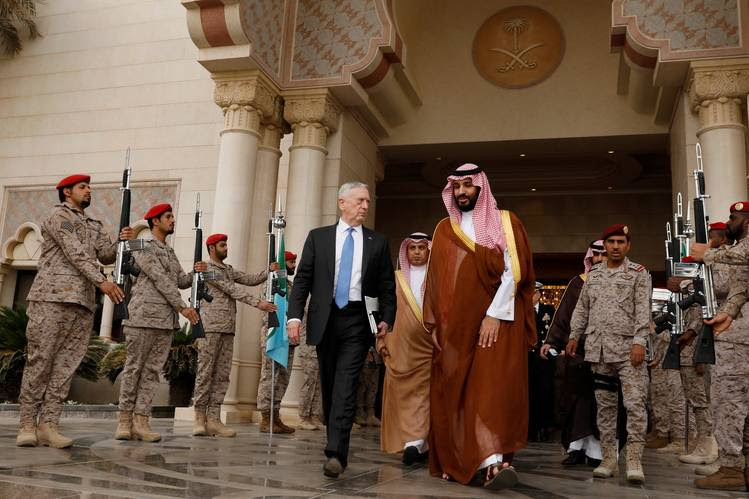Jim Mattis, in Saudi Visit, Calls for Political Solution in Yemen because it can’t be won militarily

RIYADH, Saudi Arabia — Defense Secretary Jim Mattis called on Wednesday for a political solution in Yemen between Sunni Arabs, supported by a Saudi-led coalition, and Iranian-backed Houthis, but he stopped short of publicly warning America’s Sunni allies against a planned bombing campaign targeting the port city of Al Hudaydah.
Human rights officials have warned that bombing Al Hudaydah could lead to a humanitarian crisis in Yemen, and Mr. Mattis’s remarks were in line with those of many officials in the region that the Saudi coalition’s war against the Houthis, begun two years ago, cannot be won militarily.
American officials hinted at additional military and intelligence support for Saudi Arabia and the United Arab Emirates in Yemen. They said a stepped-up military campaign against the Houthi fighters who have taken over the capital and portions of the country may be necessary to bring the group and its ally, former President Ali Abdullah Saleh of Yemen, to the negotiating table.
“In Yemen, our goal is to push this conflict into U.N.-brokered negotiations to make sure it is ended as soon as possible,” Mr. Mattis said during a short news conference after a night and a day of meetings with King Salman of Saudi Arabia, Crown Prince Mohammed bin Nayef and Deputy Crown Prince Mohammed bin Salman.
The defense secretary said Iranian support for the Houthis was destabilizing Yemen, and he talked up the relationship between the United States and Saudi Arabia. Relations are enjoying salad days in the Trump administration after years of friction between the administration of Barack Obama and the Saudi leadership, which thought Obama officials were too friendly with Iran.
Mr. Mattis’s two-day visit, the start of a weeklong tour of the region, is setting the stage for President Trump’s first visit as president to the oil-rich nation. While no date has been announced, Saudi officials visiting Washington last month broached the idea of a visit with their Trump counterparts, which got a positive reception from the president and his team. “Now that we have the blessing of our leadership, it’s important that we actually do something with it,” Mr. Mattis said. “So what we can do here today could actually open the door possibly to bringing our president to Saudi Arabia.”
Mr. Trump would certainly be more welcome than Mr. Obama, who forged a nuclear deal with Iran over the objections of Saudi Arabia and its Sunni Gulf allies, and whose administration publicly criticized the high, and growing, civilian death toll in the Saudi-led bombing campaign in Yemen. One of the final acts of the Obama administration was to block a transfer of precision munitions to Saudi Arabia in December because of concerns about civilian casualties that administration officials attributed to poor targeting.
Mr. Trump must decide if he will resume arms sales to the Saudis and whether the Pentagon, which has aided in the war against the Houthis, will share more intelligence and provide additional targeting help and other military aid.
More than 10,000 people have been killed and more than three million have been displaced in Yemen, and the country is teetering on the edge of a famine. Conditions would worsen if, as widely expected, the Saudi-led coalition attacks Al Hudaydah, which is controlled by Houthis. Sunni Arab countries are seeking intelligence and reconnaissance help from the United States to flush out Houthi fighters.
Al Hudaydah, in western Yemen, has already had a number of civilian casualties from coalition airstrikes intended to wrest it from Houthi control. Saudi officials say many Houthi missiles fired over the countries’ shared border came from Iranian shipments.
Many of Yemen’s food shipments also come through Al Hudaydah, and international humanitarian officials have warned that a sustained bombing of the city will deepen the country’s already severe food shortages. Even if Saudi airstrikes were precise, they would probably cripple Al Hudaydah’s infrastructure and stop food from getting through.
American officials acknowledged concern about the effects of a sustained bombing campaign, but they also said both sides would be more likely to compromise after one more military fight. The Houthis will not return to the bargaining table unless they are weaker militarily, and the Saudis need a face-saving way to justify a two-year war that has damaged their image abroad as military errors have exposed weaknesses in the Saudi armed forces.
Twelve Saudi soldiers were killed on Tuesday when their Black Hawk helicopter crashed in Yemen’s eastern province of Marib.
While officials say the United States is sympathetic to the Emirati view that military pressure can force the Houthis to return to the bargaining table, Middle East experts and Western diplomats in the region say that the Saudis’ real aim is to force a Houthi surrender.
“The problem for the Saudis is that strikes often hurt the Saudi public image without weakening Houthi resolve,” said Jon B. Alterman, director of the Middle East program at the Center for Strategic and International Studies in Washington.
And even if Saudi Arabia and its Sunni Arab allies do wrest control of Al Hudaydah from the Houthis, “it seems likely that the Houthis could lose the port but keep it insecure,” Mr. Alterman said.
“In that circumstance, aid to the seven million Yemenis at risk of famine will be harder to get through,” he said. “I suspect any humanitarian catastrophe would be blamed on the Saudis and the Emiratis, and not the Houthis.”



Trump should make a deal with the Sunnis: make a deal with IL once for all.
Houthis, the new Iranian Hezbollahs according to some.
I hate articles like this that discuss wars like sports matches and don’t tell you, “what are they fighting about?”
Anybody remember the reporter’s credo: Who, what, where, when, and why?
Or has that gone the way of “your rent is supposed to be one quarter of your income.”
Or is that “before your time.”